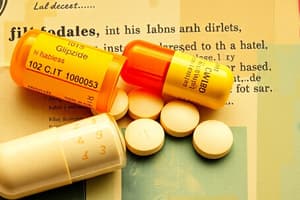Podcast
Questions and Answers
What is the therapeutic class of Glipizide (Glucotrol)?
What is the therapeutic class of Glipizide (Glucotrol)?
- Antihypertensive Drug
- Antibiotic
- Antidiabetic Drug (correct)
- Analgesic
Which of the following is a pharmacologic class for Glipizide?
Which of the following is a pharmacologic class for Glipizide?
- Oral hypoglycemic drug (correct)
- Beta blocker
- ACE inhibitor
- Calcium channel blocker
Name one drug in the 1st generation sulfonylureas class.
Name one drug in the 1st generation sulfonylureas class.
Chloropropamide
What is the pregnancy category of Glipizide?
What is the pregnancy category of Glipizide?
What is a primary use of Glipizide?
What is a primary use of Glipizide?
The action of Glipizide includes increased release of insulin from the ______.
The action of Glipizide includes increased release of insulin from the ______.
What route is Glipizide taken?
What route is Glipizide taken?
What is the peak time for Glipizide effects?
What is the peak time for Glipizide effects?
Which condition is NOT a contraindication for Glipizide?
Which condition is NOT a contraindication for Glipizide?
Which of the following is an adverse effect of Glipizide?
Which of the following is an adverse effect of Glipizide?
One treatment for overdose due to hypoglycemia is to provide ______ if the patient is conscious.
One treatment for overdose due to hypoglycemia is to provide ______ if the patient is conscious.
What is a key nursing implication for taking Glipizide?
What is a key nursing implication for taking Glipizide?
What should patients with diabetes keep as identification?
What should patients with diabetes keep as identification?
Flashcards are hidden until you start studying
Study Notes
Glipizide (Glucotrol) Overview
- Classified as an antidiabetic drug, primarily for managing blood glucose levels.
- Falls under the pharmacologic class of oral hypoglycemic drugs and 2nd generation sulfonylureas.
Comparative Drugs
- First-generation sulfonylureas include Chloropropamide, Tolazamide, and Tolbutamide.
- Second-generation sulfonylureas include Glimepiride, Glyburide, and Glyburide Micronized.
- All drugs in this class typically end with "-ide."
Safety and Use
- Assigned Pregnancy Category C, indicating potential risks that require careful consideration.
- Primarily used to control blood glucose levels in type 2 diabetes mellitus (DM), in conjunction with diet and exercise.
Mechanism of Action
- Functions by increasing insulin release from the pancreas.
- Enhances insulin sensitivity in cells.
Administration and Pharmacokinetics
- Administered orally (PO).
- Peak effectiveness occurs within 1-2 hours after ingestion.
Contraindications
- Not recommended for individuals with renal failure, hepatic dysfunction, heart failure, gastrointestinal disorders, and those with diabetic ketoacidosis (DKA).
Adverse Effects
- Common side effects include nausea, weight gain, GI distress, heartburn, dizziness, headache, drowsiness, and blood dyscrasia.
- Potential for severe complications: hypersensitivity, hepatotoxicity (indicated by nausea, vomiting, jaundice, abdominal pain, clay-colored stool, dark urine), and hypoglycemia.
- Hypoglycemia can present with rapid onset symptoms (palpitations, tachycardia, diaphoresis) or gradual onset symptoms (headache, tremor, weakness).
Drug Interactions
- Alcohol consumption can lead to disulfiram-like reactions.
- Concurrent use with NSAIDs, sulfonamides, or other antidiabetics can cause additive hypoglycemic effects.
- Beta blockers may mask the autonomic symptoms of hypoglycemia and reduce insulin release.
Overdose Management
- For hypoglycemia: if conscious, administer oral glucose (15g); if unconscious or unable to swallow, provide IV glucose or IM glucose.
Nursing Considerations
- Best taken with breakfast to enhance effectiveness.
- Educate patients to monitor for signs of hepatic toxicity and maintain a healthy diet and exercise routine.
- Patients should carry diabetic identification and keep a blood glucose log.
- Regular monitoring for adverse effects, hypoglycemia, hyperglycemia, liver function, and weight is essential.
- Pay attention to blood glucose levels during illness or stress and review lab results, especially HbA1c (target below 6.5%).
- Advise patients to limit or eliminate alcohol and monitor urinary ketones if blood glucose exceeds 300 mg/dL.
- Inquire about pregnancy plans due to potential risks.
Studying That Suits You
Use AI to generate personalized quizzes and flashcards to suit your learning preferences.



